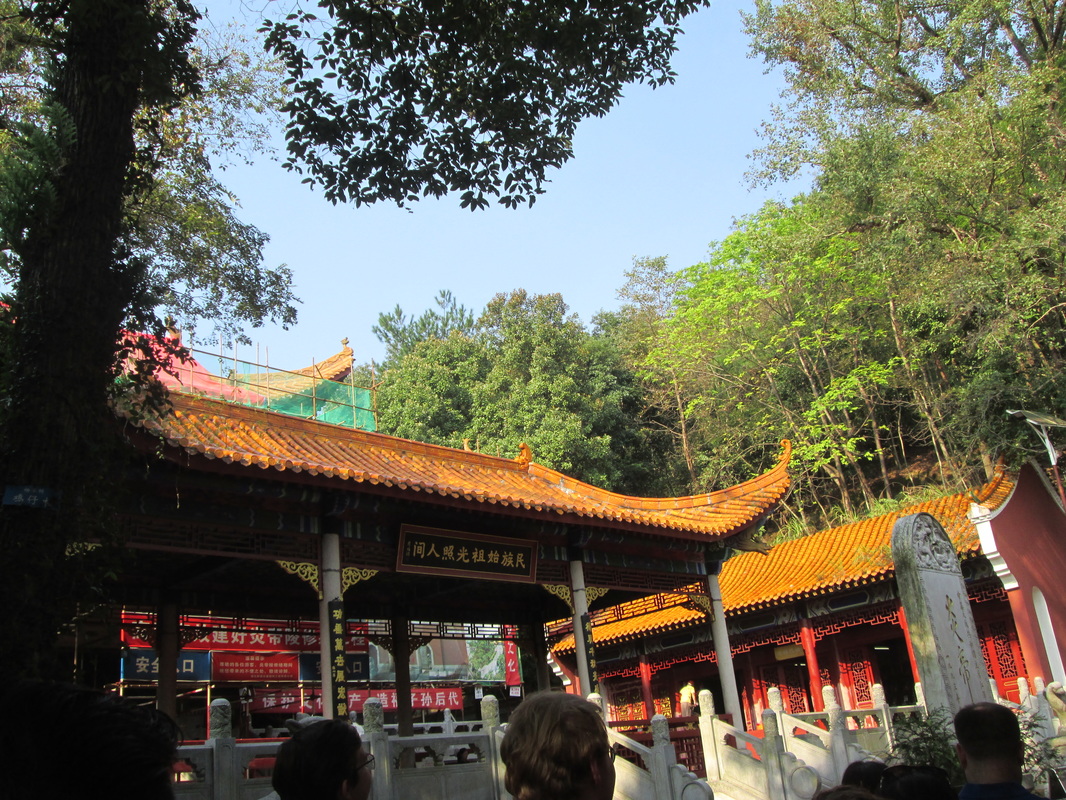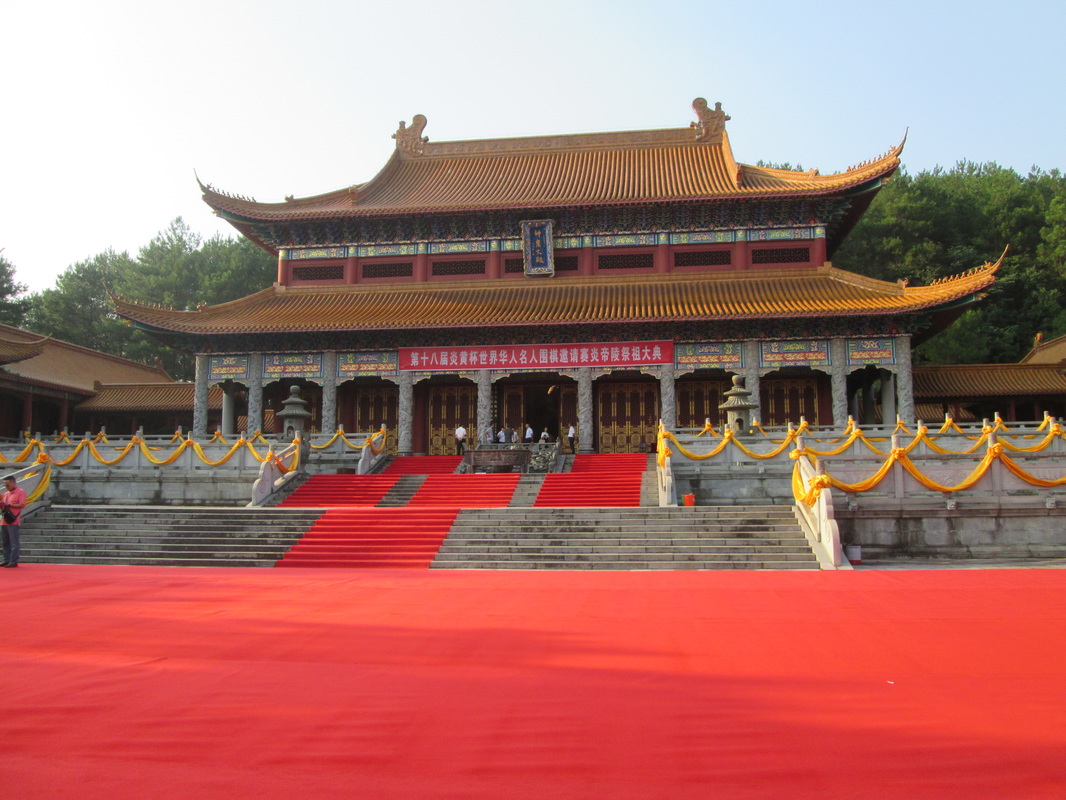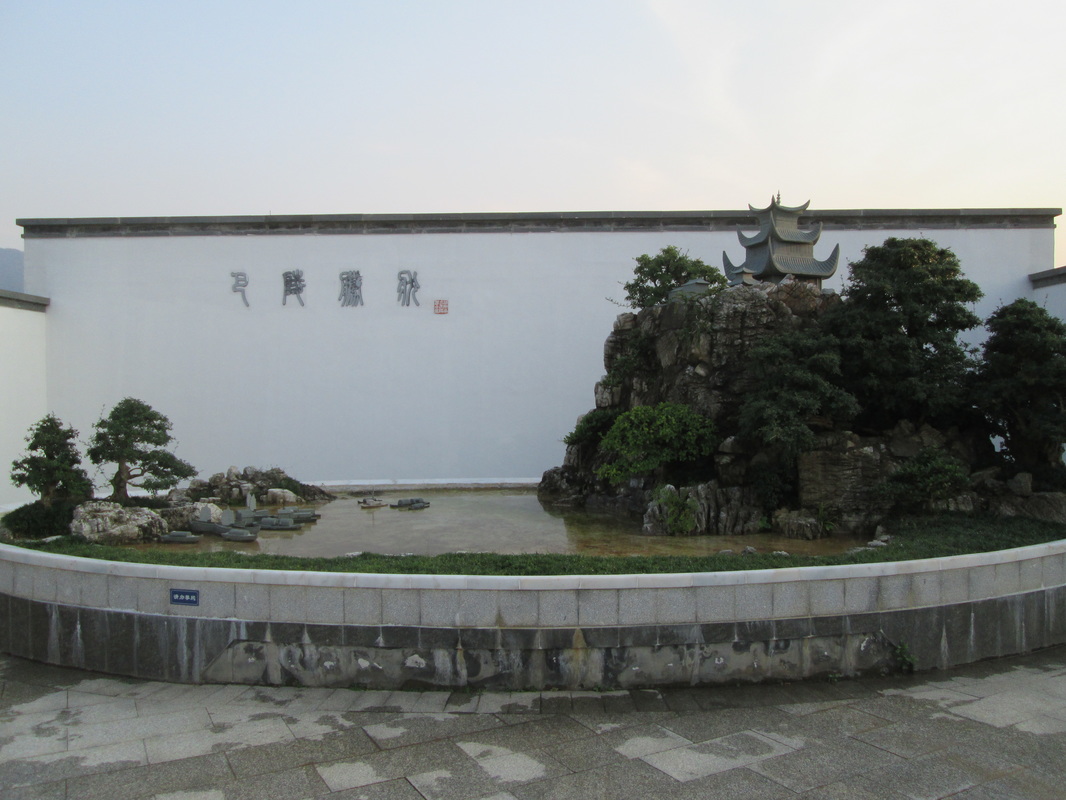I finally made my way to Yanling with a group of other foreign teachers who teach in Zhuzhou. Every year, the city puts on a few events where foreign teachers go to teach at a school where students do not have a foreign teacher leading an oral English class for a day. This year was the first time they did an overnight trip. We went sightseeing for half a day in Yanling and taught classes the next morning after the opening ceremony and requisite speeches and photos. I was excited to see Emperor Yan's mausoleum, though being the important figure he is I doubt that this is the only place with claims to him.
Being the town where Emperor Yan's bones are kept, Yanling had appropriately agrarian names throughout. Our super fancy hotel (I guess the combination of city officials and foreign guests made it impossible for the organizers to look for anything less than Yanling's best) was on a road that ran next the "Mi Xiang", "Rice River". When a couple of foreign teachers and I went out for a walk with a local teacher in the evening, she explained that the name came from the color of the water which resembled water after it's been used to wash rice. There was also a small market on a dirt lot nearby our hotel too which looked like it was selling local grown snacks. All in all, it was a good time. The fresh air was a welcome change, Yanling was pleasant, and students were slow to warm but full of questions.
I also had the opportunity to pop in and say hi to some of my former students when their school held a sports day on our school's large field. Last year, each class was asked to dress in the national costume of a different country. This year, they were asked to dress as different minority groups of China. As someone who grew up in the American racial context and has a background in liberal arts, I do find it problematic though I realize too that for my students it's just what they were asked to do for a school event. I have to admit, I was really impressed when a few of my students rode down the track on real ponies with "Kalinka" playing in the background. It was good to catch up with them and remind them to be nice to the new teacher working there this year.
Aside from school and travels, I've been sitting down to think about where to go from here. I'm not unhappy and I've grown a lot from this. Public speaking doesn't make me sick like it used to, I'm more comfortable with the idea that it's OK for me to take up space and make noise as much as anyone else in this world. Teaching here the past few years has helped me see more clearly all the ways in which my lack of confidence has really affected me. When you're leading a classroom, you really have to remember your power as a teacher which is something I've struggled with at times as someone who generally has been most comfortable at the back of the room or as someone who would rather write an essay than stand and speak in front of a room of people. Which is partly why I came. China could continue to offer challenges, but because I'm finding I'm more capable than I gave myself credit for I can't help asking myself: "What else could I try?"
As it stands now, I have a list on the fridge of things that have crossed my mind in further studies and other lines of work. I've also started up a notebook with little tabs as I dig into these things further and ask myself what it is about these things that appeal to me and what I might contribute in the future as a result of these decisions. There is, admittedly, the part of me that continues to feel rather lost and think "Whatever it is, it's a life" but I'm coming to better accept that lost is everyone's condition to some degree. Just keep moving. No promises any which way, but it's something. The weather is cooling off so I suppose I'll have time to sit down with a hot cup of Tie Guan Yin/ hot chocolate/instant coffee/Earl Grey and mull it over during the coming months. I've also got a few China related goals like building up my Chinese since I got lazy last year and paying a visit to Hangzhou, Taipei, Putuoshan, and a few other places. I wouldn't mind trying to find my way to Taishan either.
I've been reading more China travel books lately. I finished Ella Maillart's "The Forbidden Journey", which was already really interesting as an account of traveling around 1930's China from Beijing to Kashmir but especially so for Maillart's rather anthropological attention to the people she meets and the things she sees. Her travel companion, Peter Fleming, wrote a book of his own which is stylistically quite different. Where Maillart was happy to stay a few extra days and look around, Fleming largely wanted to be on the move. Fleming's writing, I can't help noticing, is brisk and exciting but since I read Maillart first I can't help feeling it's short on detail (but as someone who has taken a number of writing classes and learned the importance of writing what is needed and no more, it's not a move I necessarily find wrong, it just takes some adjustment). I grouch about 30 hours on a slow train from Hunan to Sichuan, while those two made it across the country with train, camel, horse, and cart. Strangely, even from this distance about 80 years later there are some things that are painfully familiar as a traveler in China. I've also decided to come back and finish the last third of Marco Polo. I had to put it down because I was sick of reading the same opening line about Saracens and Moslems over and over again and how many places seem to have a tradition of letting guests from far away sleep with their women. Still, I can't help seeing it as something of an ur-text for those who travel and write about China and it has been pretty interesting to slowly work through all these layers of China books from Marco Polo to Ella Maillart to Paul Theroux to Peter Hessler to Jen Lin-Liu and other more contemporary writers. A different little slice of life in this country in different periods. I think of the 10 different layers you can see when you go to visit the site where Troy used to stand, but I'm creating it through travel accounts inside my head instead.



 RSS Feed
RSS Feed
